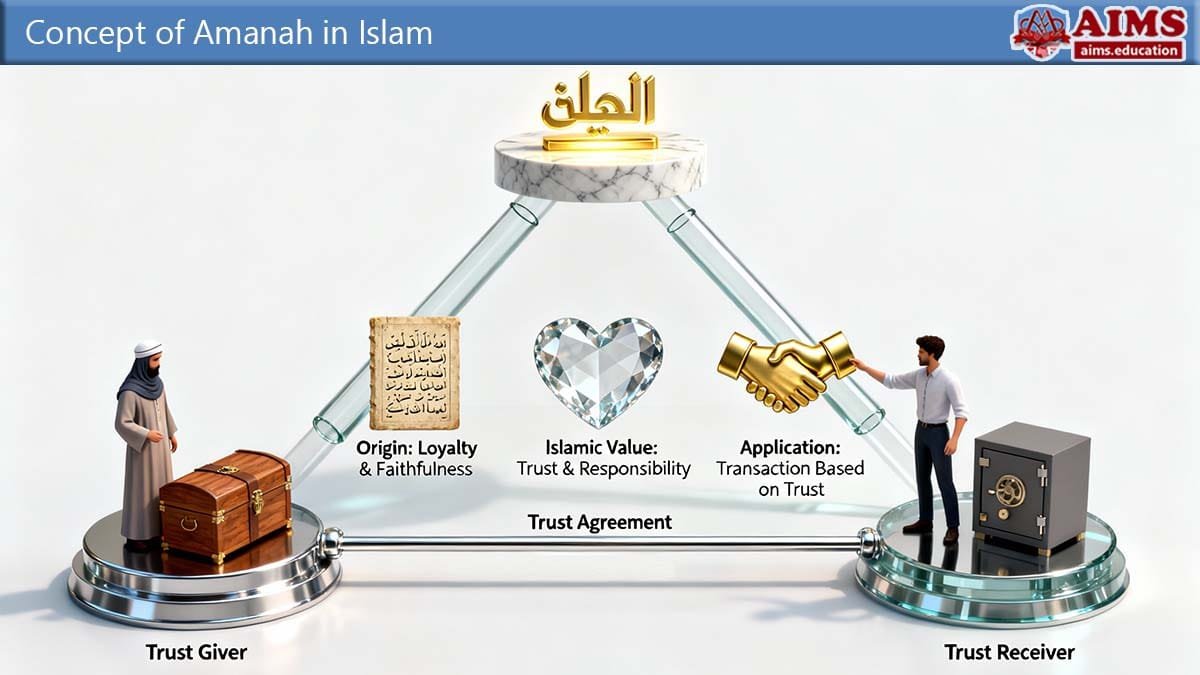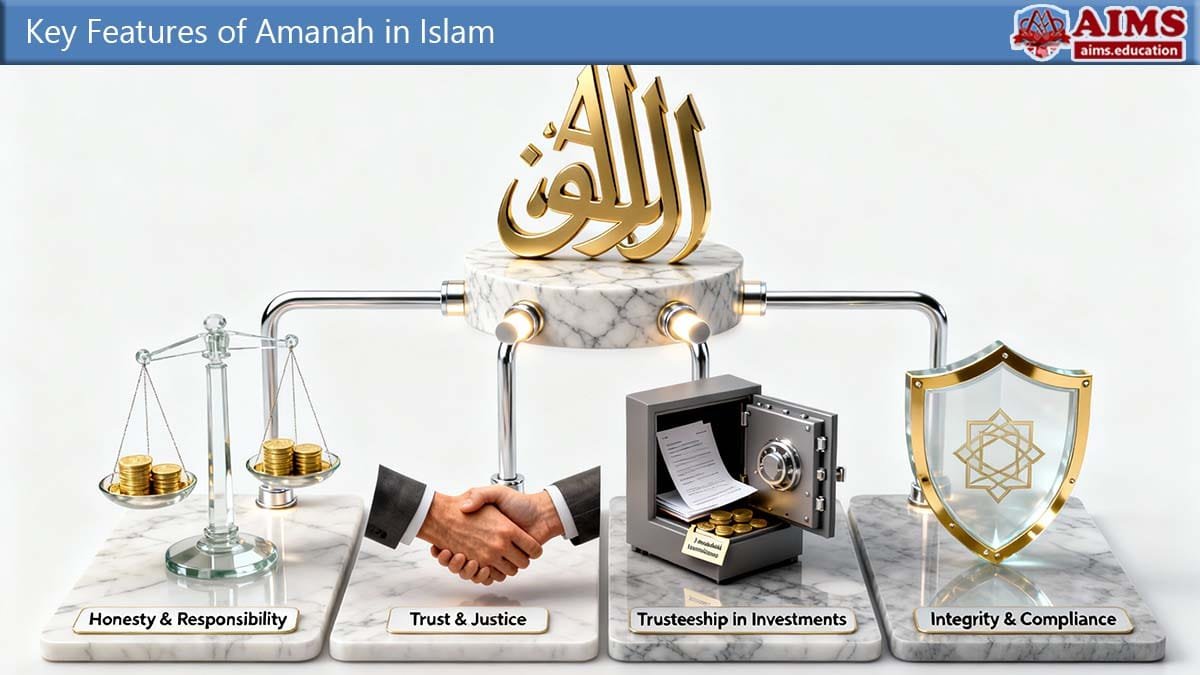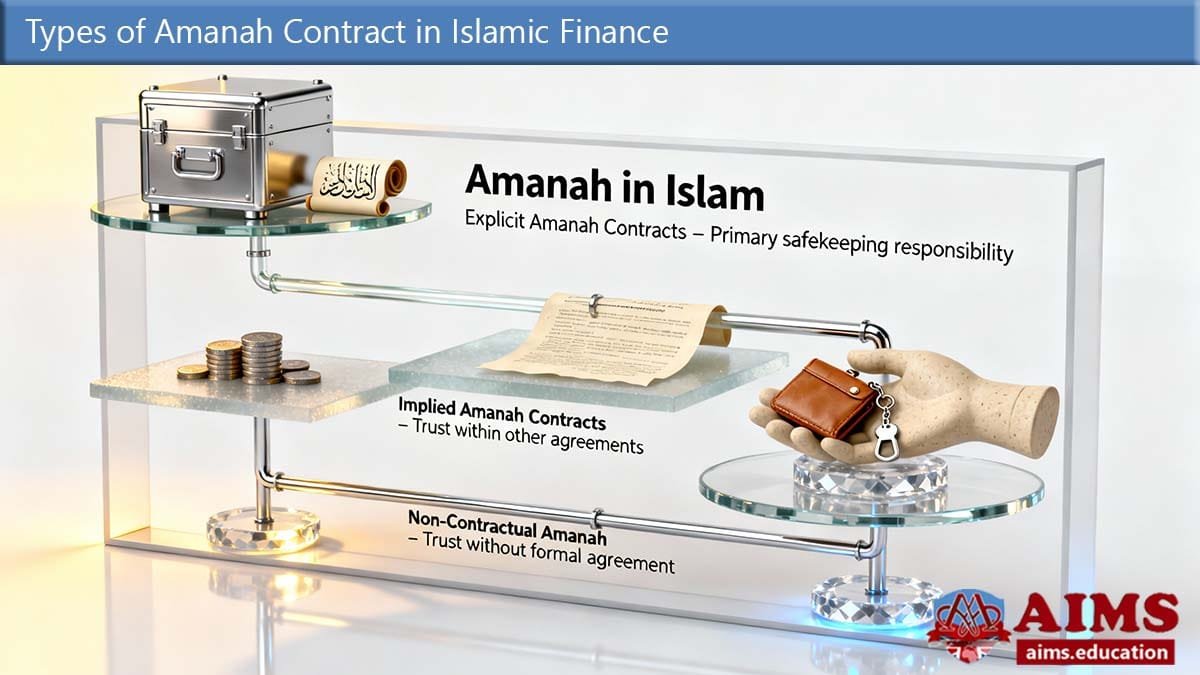What is an Amanah?
“Amanah” (امانة) originates from an Arabic word that means trust or loyalty. In Islamic banking and finance, it refers to a transaction when a person gives something (such as property or other asset) to another person or an institution on the basis of trust, when the other party promises to do something. The root word of Amana is “Iman,” which means belief or faith, and it mentions its importance in the Islamic religion and its connection with Allah in dealings.
In the guidelines of Shariah it signifies integrity and fulfilling our duties towards Allah and all His creations under the guidelines that deal with Shariah rules. If someone accepts an Amanah, the person must do what they promised to do. It keeps individuals connected with society based on the Islamic economic system.

Types of Amanah
Amana is essential for maintaining our relationship with Allah and developing community trust. It can be categorized into two types:
1. Amanah Towards Allah
This includes fulfilling Muslim religious duties, obeying Allah’s commands, and living according to His guidance, such as performing prayers, fasting, and following Islamic principles.
2. Amanah Towards People
This involves being honest and trustworthy and fulfilling responsibilities in our dealings with others, such as returning borrowed items, keeping promises, and treating others with fairness.
Quranic Verses Regarding Amanah
Allah emphasizes Amanah in detail:
“Indeed, we offered the Trust to the heavens and the earth and the mountains, and they declined to bear it and feared it; but man (undertook to) bear it. Indeed, he was unjust and ignorant.”
Quran Al-Ahzab: Verse 72
“Verily! Allah commands that you should render back the trusts to those, to whom they are due; and that when you judge between men, you judge with justice. Verily, how excellent is the teaching which He (Allah) gives you! Truly, Allah is Ever All-Hearer, All-Seer.”
Quran An-Nisa: Verse 58
“And if Allah had so willed, He would have made you a people, but He misleads whom He wills, and guides whom He wills, and verily ye shall be questioned of what ye used to do.”
Quran An-Nahl: Verse 93
“The first Amanah we are entrusted with is to be a true worshipper of Allah (SWT) and to live in this world by obeying Allah’s laws and commands. Allah says: “O you, who believe, do not betray (the Amanah or trust of) Allah and His Messenger, and do not knowingly violate your trusts.”
Quran Anfal: Verse 27
“We have to fulfil Amanah properly so that we will be considered among the believers who fulfil their contracts, their promises and their agreements. If we do so, we will enter Ferdaus (paradise), In Sha Allah. Because fulfilling Amanah is one of the major qualities of true believers (Mu’min). Allah (SWT) says: “Those who are faithfully true to their trusts and to their covenants; and those who strictly guard their prayers. These are indeed the inheritors who shall inherit Paradise.”
Quran Al-Mu’minun: Verse 8-11
“Truthful to their trusts (amanah) and to their pledges.”
Quran Al-Ma’arij: Verse 32
Importance of Amanah in Hadith
The Messenger of Allah Muhammad (SAW) narrated many hadith regarding Amanah:
“All of you are shepherds and each of you is responsible for his flock. An Imam is a shepherd and he is responsible for those in his care. A man is a shepherd in respect of his family and is responsible for those in his care. The woman is a shepherd in respect of her husband’s house and is responsible for those in her care. The servant is a shepherd in respect of his master’s property and is responsible for what is in his care. All of you are shepherds and each of you is responsible for his flock.”
Hadith
“Signs of a hypocrite are three: whenever he speaks he lies; whenever he promises, he breaks his promises; and whenever he is entrusted with an Amanah, he betrays his trust (Amanah); even if he fasts and prays and even if he claims he is a Muslim.”
Hadith
“There is no faith for the one who has no trust (Amanah), and there is no religion for the one that does not fulfil his promises.”
Hadith
“One of the most evil people before Allah on the Day of Resurrection will be a man who is intimate with his wife and she is intimate with him, then he broadcasts her secrets.”
Hadith
“If a man says something then turns away, it becomes a trust (which should not be disclosed by the one who heard it).”
Hadith
“When Amanah is neglected, then await the Hour.” He said: How would they be neglected, O Messenger of Allah? He (blessings and peace of Allah be upon him) said: “When positions of authority are given to people who are not qualified for them, then await the Hour.”
Hadith
“O Abu Dharr, you are weak and it is a trust, and on the Day of Resurrection it will be a source of humiliation and regret, except for the one who takes it and fulfils all obligations and does all duties required.”
Hadith

4 Key Features of Amanah in Islamic Banking
Amana or ‘trust’ is an essential principle in Islamic Banking and Finance, used to administer funds ethically and responsibly according to Shariah rules. Here are its key features:
- It requires honesty and responsibility in investments and transactions.
- Islamic banks act as trustees, confirming that customers’ money should be used in permissible and productive actions.
- It raises trust among the bank and its clients and promotes justice.
- It makes it possible to maintain the integrity of Islamic Complaint Finance.
Amanah is discussed in detail during the distance learning Islamic finance certification and online Islamic banking and finance diploma programs that AIMS offers.
4 Major Principles of Amanah
The major principles of Amanah in Islam are given below. According to these principles, Muslims should:
- Act loyal to Allah and His creations, devoting commitments and fulfilling trusts completely.
- Recognize and fulfill duties towards Allah to the best of their ability.
- Uphold the highest ethical and moral standards when keeping Amanah.
- Be aware of accountability to Allah and those with rights over them, regularly reflecting on how well they accomplish their responsibilities.
Examples of Amanah
There are three main scenarios of Amana in Islam:
1st Scenario: Financial Rights that are Established by Contracts and Covenants
The items entrusted for safekeeping, loans, rentals, and found or lost property fall under Amanah and must be handled responsibly, even without a formal contract. The jurists interpret it in the following three scenarios:
a. Explicit Amanah Contracts
Where safekeeping is the primary focus, such as leaving an item with someone for protection. For example:
- If you accept an Amana, it is mandatory (wajib) to safeguard it. If negligence leads to its loss, you must compensate.
- If the loss occurs without fault, such as theft or fire, no compensation is required unless given voluntarily.
b. Implied Amanah Contracts
In this case, the trust is secondary, such as in rentals, borrowing, partnerships, or collateral. For example, if you depositing money in an Islamic bank for safekeeping and the bank holds the money with trust and does not use it for profit unless permitted.
c. Non-Contractual Amana
In this case, the trust arises without a contract. For example, someone finds lost items like money, wallet, or jewelry on the street. In this case, the person who found the item is responsible for safeguarding it and putting maximum effort into returning it to its owner without any carelessness.
2nd Scenario: Keeping People’s Secrets
This type of Amanah in Islamic teachings includes safeguarding the confidence or private information shared by someone and not disclosing it without permission to others, except in cases where withholding the secrets would lead to injustice or harm.
3rd Scenario: Positions of Responsibility
All positions of responsibility, whether social, public, or private, are considered as Amanah in Islam. These positions include leadership, judiciary, management, and family care, and they must be fulfilled with truth and justice.

Importance of Amanah in Islamic Order
It is a major component of the Islamic socio-economic order. Allah has entrusted us with free will and time, and it is our responsibility to ensure the integrity of the trust by accomplishing our religious obligations and duties.
- Everything Allah has bestowed Muslims with is an Amana, and Muslims should safeguard these blessings.
- Allah has also made Muslims caliph on the earth, entrusting them with the care of the environment and all His creation.
- It is essential in personal, business, and societal dealings, as neglecting it can lead to Allah’s displeasure, mistrust, corruption, and the interruption of families and communities.
Prophet Muhammad (PBUH): Ultimate Model of Keeping Amana
A great example of Amanah is our Prophet (Peace Be Upon Him), known as Al-Amin (Honest, Trustful, Trustworthy), who fulfilled trust in the best way. Even the disbelievers of Makkah, who rejected the Prophet (PBUH) and opposed him, entrusted their belongings to him during their travels, reflecting his unwavering commitment to Amana.
During the Hijra (migration from Makkah to Madina), the Prophet SAW entrusted Hazrat Ali (RA) to stay behind and return the possessions of those entrusted to him, including his enemies.
Frequently Asked Questions
Q1: What is Amanah in Islam?
Amanah means trust or responsibility. It is the obligation to safeguard what is entrusted and to fulfil promises in line with Shariah. In Islamic banking and finance, Amanah guides the ethical handling of deposits, assets and information so that rights are preserved and dealings remain just and transparent.
Q2: What are the main types of Amanah?
Amanah has two broad dimensions: duties towards Allah—such as obeying divine commands and practicing worship—and duties towards people, including honesty, returning entrusted items, keeping contracts, and treating others fairly.
Q3: How does Amanah operate in Islamic banking?
Islamic banks act as trustees, using customers’ funds only for permissible, productive purposes and maintaining clear accountability. The trustee relationship emphasises honesty, proper safekeeping, and disclosure, strengthening client trust and Shariah compliance across products and transactions.
Q4: What are the key features of Amanah in finance?
Core features include honesty in transactions, responsible stewardship of assets, justice in dealings, and strict alignment with Shariah rules. These protect stakeholders, enhance confidence between banks and clients, and uphold the integrity of Islamic banking.
Q5: What principles guide someone keeping an Amanah?
A trustee should fully honour commitments, recognise duties to Allah and people, uphold high ethical standards, and remain conscious of accountability. Regular self-review helps ensure responsibilities are fulfilled without negligence.
Q6: What is the difference between explicit and implied Amanah contracts?
In explicit Amanah, safekeeping is the primary purpose—e.g., depositing an item for protection. In implied Amanah, trust is secondary within another contract—e.g., rentals, partnerships or collateral—where the entrusted party must still safeguard assets responsibly.
Q7: Is compensation due if an entrusted item is lost?
If loss occurs due to negligence, compensation is required. If loss happens without fault—such as theft or accidental fire—compensation is not due, unless the trustee voluntarily compensates. Diligent care and documentation help demonstrate non-negligence.
Q8: How does Amanah apply to secrets and confidential information?
Keeping people’s secrets is an Amanah. Confidential information should not be disclosed without permission, except where withholding would cause harm or injustice. This protects dignity, rights, and social trust.
Q9: Which roles are considered Amanah in Islam?
Positions of responsibility—such as leadership, judiciary, management, and family care—are Amanah. They must be carried out with truth, justice, and accountability, since these roles directly affect people’s rights and wellbeing.
Q10: Why is Amanah important for the Islamic socio-economic order?
Amanah underpins trust across personal, commercial and public life. Neglecting it leads to mistrust and corruption. Fulfilling Amanah sustains justice, preserves rights, and supports Shariah-compliant finance and community stability.
